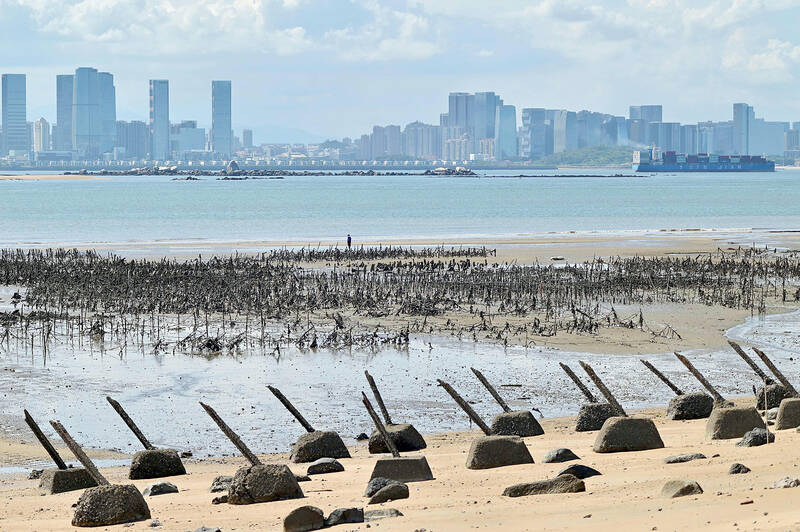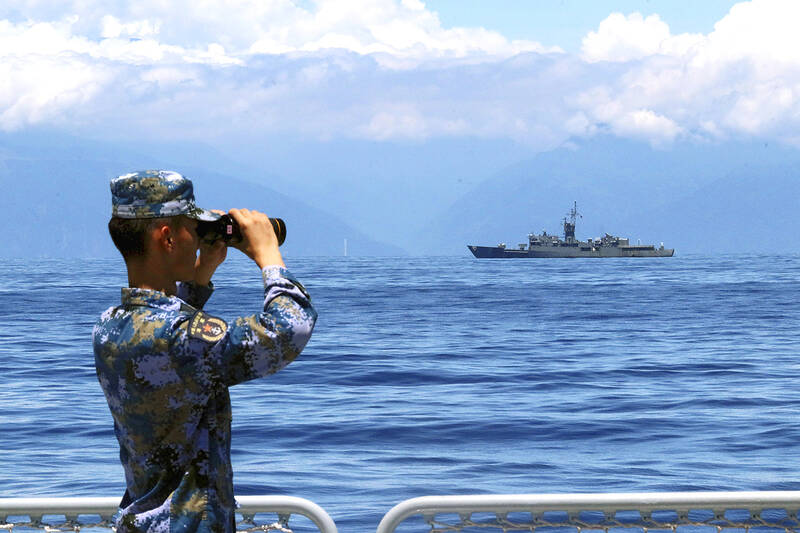Ian Easton says there is a tendency in Washington to avoid thinking about worse-case scenarios. This is perhaps why The World after Taiwan’s Fall is the first in-depth analysis of its kind.
“To the extent that you do think of worse-case scenarios, you tend to do in a very quiet and closed door environment because these are globally sensitive issues and they make people uncomfortable,” he tells me over coffee last month at Taipei’s Grand Hyatt.
The study asks six contributors from the US (Easton), Japan, South Korea, Australia, India and the EU to imagine the global impact of a successful invasion of Taiwan by China, and how their countries would respond. The contributors all agreed that none of the respective governments are taking this issue seriously and faith in the the US as a security guarantor would be in tatters.

Photo courtesy of Ian Easton
Ian Easton is a senior director at the Project 2049 Institute think tank. A regular contributor to the Taipei Times, he is the author of the recently published The Final Struggle: Inside China’s Global Strategy, as well as The Chinese Invasion Threat: Taiwan’s Defense and American Strategy in Asia.
In the following interview, which has been condensed and edited, I ask Easton about what Taiwanese would face after a successful Chinese invasion, whether the US should maintain its policy of strategic ambiguity and whether a version of NATO would be right for Asia.
Taipei Times: What would it be like for Taiwanese in Taiwan following a successful invasion by China?

Photo: AFP
Ian Easton: Nobody can say for sure, but at a minimum Taiwan is going to be treated like any other place in China. What that means is that people would lose all of their freedom of speech; their freedom of religion; freedom of expression; they would lose any and all human rights. They would lose the ability to vote. They would have no control over their futures. There would be no such thing as rule of law anymore. There would be no such thing as investigative media, alternative political parties.
And that’s just the beginning. If you were in the military, if you worked for the government, you would almost certainly be investigated and arrested and probably shipped off to concentration camps or reeducation camps in China or those set up here. High-level [politicians] could be tortured and executed.
[Young Taiwanese] would be used as cannon fodder. So this is something that the PLA [People’s Liberation Army] has done repeatedly throughout its history — this happened a lot in the Chinese Civil War. Units that defect to the PLA side would then be used as cannon fodder because they were viewed as untrustworthy or subhuman. The results were atrocious. And this is what would happen, Taiwanese young men would grow up in a world where they would be conscripted into the PLA and they are going to have to fight as cannon fodder on the front lines of the next war, because China is not going to stop expanding outward.

Photo: AP
For women it’s even worse. Taiwanese women are some of the freest and best protected women in all of Asia — that would all disappear in a heartbeat. There would be a tremendous amount of abuse.
If you look at the way the Chinese media — Global Times, Xinhua or People’s Daily — talk about Taiwanese, they talk about them as if they are subhuman in some cases. It’s very disgusting and very dangerous, that extreme radical nationalism that China’s government promotes. It’s ugly stuff.
TT: The South Korean contributor remarked that Seoul must conduct a national conversation about Taiwan, so that at least its citizens are psychologically prepared for what might happen if China invades. What of the US?
IE: Of course. And because of strategic ambiguity and our “one-China” policy,” we’ve had leaders that typically shy away from talking about these types of scenarios, with the exception of [US] President [Joe] Biden. I think president Biden has done a very good job of finally addressing this in very public ways and he’s been very candid... I’m sure it’s going to come up in the election and I think the American people and people in other countries are starting to wonder what their government’s position is. And so I think that this is going to become a very important issue politically if it’s not already, and governments owe it to their people to articulate a strategy, a policy that makes sense.
TT: How would the loss of Taiwan to China affect US prestige as security guarantor to allies and China’s political influence in East Asia and beyond?
IE: It would be devastating. It would be a decisive strategic loss and a lot of countries that are already watching their own sovereignty crumble as the Chinese Communist Party’s economic and technological leverage over them grows, and as the influence of Chinese intelligence in their own countries grows — that would be the tipping point.
TT: In that context, do you think the US should change its policy from strategic ambiguity to strategic clarity?
IE: My view is that we have to move toward strategic clarity and I think president Biden has already started that process. But there is still a lot more work to be done. He’s said it [that he will defend Taiwan], so rhetorically we’ve already moved toward strategic clarity. President Biden is committed to the defense of Taiwan. But the question is: there is a say/do gap. He said it, but what is the action? How many US troops are here in Taiwan to deliver on his commitment. Is Taiwan in our nuclear umbrella or aren’t they? Are we going to sign a mutual defense pact, or are we not? Are we going to invite them to the Pacific Rim exercises or not? Are we going to start to have bilateral military exercises?
Another area that I believe should be a no-brainer is we should have communication mechanisms in place at the operational and tactical level to deconflict and to make sure there will never be friendly fire in the event of attack. And those mechanisms currently don’t exist.
TT: You write that neither the US or Taiwan has a national strategy for China, further writing that “overmilitarized foreign policies are failed foreign policies.” How would this “national strategy for China” look?
IE: We do have a national defense and security strategy. But we don’t have any kind of articulated strategy for China.
It’s possible, theoretically, that it exists and it’s being kept secret and that one day will leak or one day will be disclosed to the public. But as far as we know there is no national strategy for China. And the same also applies for Taiwan. And if the strategy is going to be effective, it needs to be made public. We need to have transparency because right now our diplomats don’t know, the American business community certainly doesn’t. Hollywood certainly doesn’t. Wall Street certainly doesn’t. University administrators don’t. It needs to be very clear.
What do we want to do? What is the future of US-PRC [People’s Republic of China] relations? And what is the future of the next Cold War? That’s what we are in now, and is the goal to slowly erode the Chinese Communist Party and hopefully empower the Chinese people to decide their own political future? Or is the goal simply to contain the Chinese Communist Party and the PLA so they don’t invade any of their neighbors and take territory they currently don’t control?
Is the strategy somehow to maintain engagement and maintain current levels of business ties or to slowly decouple or strategically decouple. This all leads down very different paths and comes with different degrees of risk and danger and opportunity costs. And I think we need to have a national debate on our strategic objectives here because if we don’t have a vision for the future, we won’t get anywhere.
Or we’ll get to some place where we really, really don’t want to be because clearly, and I think document after document shows this, speech after speech shows this that Xi Jinping (習近平) shows this, he has a very clear vision for the future. He has a vision for the future of Taiwan. He has a vision for the future of the world order. He has articulated it. It’s written in textbooks that every student in China reads and understands and absorbs. So they know what their objective is. They know the world order that they are trying to create, so that gives them a great strategic advantage.
All of that informs [China’s] military build up [and] the passage of laws. It informs their economic decisions. It informs their development in science and technology and basic research. It informs their diplomatic policies. It informs their propaganda, their intelligence services and their influence operations.
We face probably the most dangerous foreign policy test of our times, maybe since the run-up to World War II, and we have not yet woken up to it. The US government is still kind of downplaying the threat and the Taiwanese government is still downplaying the threat. When the ballistic missile flew over Taipei last summer, the government actively covered it up. The US government was actively covering up the spy balloon, until it was exposed by the media. And even after the spy balloon was shot down, they tried to downplay the severity of what a terrible intelligence breach that that was, to have such a sophisticated collector overhead. So this is a problem we have. It’s almost Stockholm Syndrome: we blame ourselves for being victimized by Chinese intelligence. Or by provocations from the Chinese government. So we need to stop doing that.
TT: Do you think an Asian version of NATO is a possibility in the near future?
IE: Is it possible? Yes. Is it likely? I personally think it is likely. That’s what’ll likely transpire over the next 10 years. But not for the right reasons. It would be great if something like that happened because all our national-level leaders would sit around a table and say yes, this is the rational thing to do so we should do this.
I don’t think that’s going to happen. What I think is more likely to happen is that there are going to be a series of crises and that’s going to force these hard decisions. Just in the same way, there was a series of crises in Berlin in the late 40s and early 50s that forced the US and Western European allies to form NATO. They would not have formed NATO in the absence of that existential threat. Barring some visionary political leadership, yes, it will be reactive. That is my best guess.

On April 26, The Lancet published a letter from two doctors at Taichung-based China Medical University Hospital (CMUH) warning that “Taiwan’s Health Care System is on the Brink of Collapse.” The authors said that “Years of policy inaction and mismanagement of resources have led to the National Health Insurance system operating under unsustainable conditions.” The pushback was immediate. Errors in the paper were quickly identified and publicized, to discredit the authors (the hospital apologized). CNA reported that CMUH said the letter described Taiwan in 2021 as having 62 nurses per 10,000 people, when the correct number was 78 nurses per 10,000

As we live longer, our risk of cognitive impairment is increasing. How can we delay the onset of symptoms? Do we have to give up every indulgence or can small changes make a difference? We asked neurologists for tips on how to keep our brains healthy for life. TAKE CARE OF YOUR HEALTH “All of the sensible things that apply to bodily health apply to brain health,” says Suzanne O’Sullivan, a consultant in neurology at the National Hospital for Neurology and Neurosurgery in London, and the author of The Age of Diagnosis. “When you’re 20, you can get away with absolute

May 5 to May 11 What started out as friction between Taiwanese students at Taichung First High School and a Japanese head cook escalated dramatically over the first two weeks of May 1927. It began on April 30 when the cook’s wife knew that lotus starch used in that night’s dinner had rat feces in it, but failed to inform staff until the meal was already prepared. The students believed that her silence was intentional, and filed a complaint. The school’s Japanese administrators sided with the cook’s family, dismissing the students as troublemakers and clamping down on their freedoms — with

As Donald Trump’s executive order in March led to the shuttering of Voice of America (VOA) — the global broadcaster whose roots date back to the fight against Nazi propaganda — he quickly attracted support from figures not used to aligning themselves with any US administration. Trump had ordered the US Agency for Global Media, the federal agency that funds VOA and other groups promoting independent journalism overseas, to be “eliminated to the maximum extent consistent with applicable law.” The decision suddenly halted programming in 49 languages to more than 425 million people. In Moscow, Margarita Simonyan, the hardline editor-in-chief of the